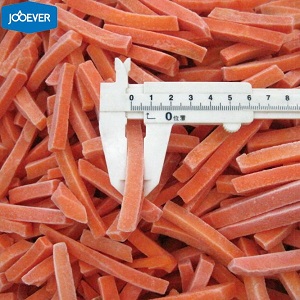Your reliable partner for frozen foods
The healthiness of frozen vegetables compared to fresh ones is a topic of interest for many, and the answer is generally yes, frozen vegetables can be just as healthy as fresh vegetables. Here’s a detailed explanation:
Peak Ripeness: Frozen vegetables are typically harvested at their peak ripeness, when they are most nutrient-dense. Immediately after harvesting, they are blanched (briefly boiled) to kill bacteria and halt enzyme activity that can degrade the vegetables. They are then flash-frozen, which helps lock in their vitamins and minerals.
Nutrient Preservation: The rapid freezing process helps preserve the nutritional content. Some studies have shown that certain nutrients, such as vitamin C and antioxidants, are retained better in frozen vegetables compared to fresh vegetables that may have been stored for a few days before being consumed.
Nutrient Degradation: Fresh vegetables can lose nutrients during transportation and storage. The longer they are stored before being eaten, the more nutrients they can lose. For example, spinach can lose about 75% of its vitamin C content after being stored at room temperature for just a few days.
Comparative Studies: Various studies have compared the nutrient content of fresh and frozen vegetables. Some have found that frozen vegetables have similar or even higher levels of certain nutrients compared to fresh ones, especially if the fresh vegetables are not consumed soon after harvest.
Variety of Nutrients: Both fresh and frozen vegetables provide essential nutrients such as vitamins, minerals, and fiber. The differences in nutrient content are generally small and not significant enough to affect overall health if you have a balanced diet.
Availability: Frozen vegetables provide year-round access to a variety of vegetables, regardless of the season.
Reduced Waste: They have a longer shelf life than fresh vegetables, which can help reduce food waste and ensure you always have healthy options available.

Vitamins and Minerals: Both fresh and frozen vegetables are good sources of essential vitamins and minerals like vitamin A, vitamin C, folate, and potassium.
Fiber: Both types are high in dietary fiber, which is important for digestive health.
Preserved Antioxidants: Frozen vegetables often retain their antioxidant properties, which help protect the body from oxidative stress and inflammation.
Check Labels: Some frozen vegetables may come with added sauces, salt, or preservatives. It's important to choose plain frozen vegetables without added ingredients for the healthiest option.
Nutrient Retention: Cooking methods can impact nutrient retention. Steaming, microwaving, or lightly sautéing vegetables (fresh or frozen) helps preserve nutrients better than boiling.
| Feature | Fresh Vegetables | Frozen Vegetables |
|---|---|---|
| Harvest Timing | Harvested and consumed at varying ripeness | Harvested at peak ripeness and flash-frozen |
| Nutrient Content | Can degrade over time during storage | Nutrients are preserved during freezing |
| Shelf Life | Short, needs to be consumed quickly | Long, reducing waste |
| Availability | Seasonal availability | Year-round availability |
| Convenience | Requires washing and preparation | Pre-washed and ready to cook |
| Added Ingredients | None typically, but can spoil quickly | Check for added sauces or salt |
Frozen vegetables are generally as healthy as fresh vegetables and can sometimes be more nutrient-dense, especially if fresh vegetables are not consumed shortly after harvest. Both options offer essential vitamins, minerals, and other nutrients important for a balanced diet. Choosing between fresh and frozen often comes down to personal preference, convenience, and how quickly you plan to use the vegetables.